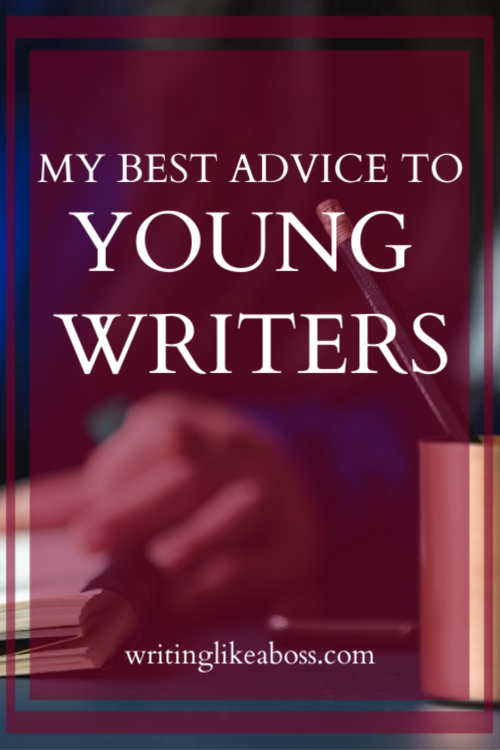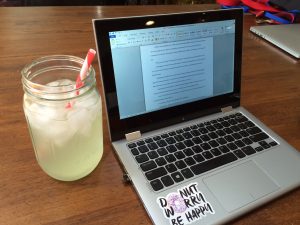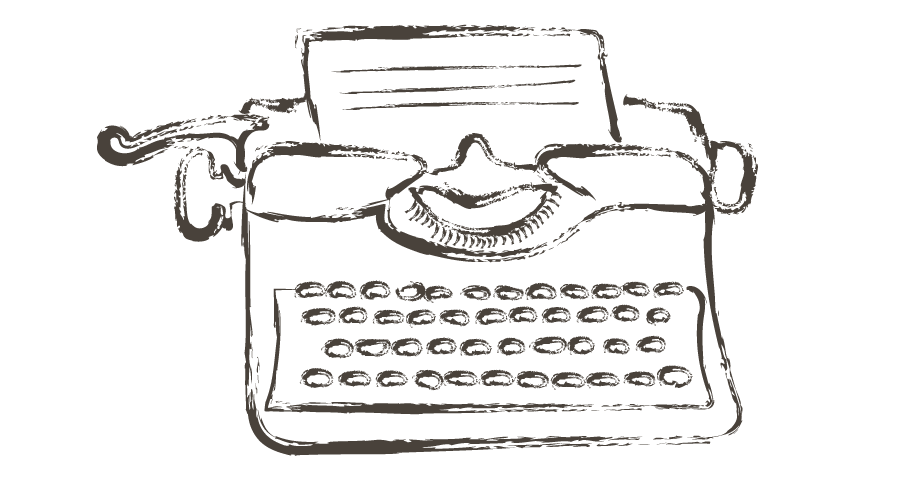Hey, writers!
As someone who started writing young herself, I love connecting with other passionate young writers. And I often get asked about my best writing advice.
Well, here is my best advice for young writers!

Never be afraid of self-publishing.
For some writers, self-publishing = evil.
Yes, I will admit that it would be fabulous to see my book on Barnes and Noble bags. I daydream about having a buzzing message board just for my book series. Watching my very own fanbase grow to incredible heights, just like my favorite authors. I imagine going to book signings, getting my own licensed merchandise, etc. etc.
It’s a sweet, sweet dream. And no one said it’s impossible, mind. But don’t forget that no one started as a literary, world-renowned book master! Not even Jane Austen was born with a book and a quill in hand. Everyone started out just like you: a writer with a dream and a story to tell.
And I’m here to tell you: self-publishing is a legitimate publishing route. It isn’t any less wonderful than traditional-pub, and it isn’t a last resort. In fact, self-pub is on the rise! So many writers are pursuing their own independent routes right now.
The moral of the story? Never be afraid of self-publishing. It’s a fantastic way to get your writing out into the world!
Participate in NaNoWriMo at least once.
Maybe you’ve said things like, “Yeah, NaNoWriMo just isn’t my thing,” or even: “I don’t think I’m good enough for this.”
Here’s the thing, though:
- You don’t need to be “good enough” to partake in NaNo.
- NaNo isn’t just a November thing: so if you’re too busy to write that month, you can sign up for Camp NaNo in April and/or July.
- Don’t think you can write the overwhelming 50K? Participate in the YWP NaNo instead, in which you can choose your own word count for the month! (intended for ages 13 – 18)
NaNo is one of the most rewarding experiences for a writer. You complete NaNo, you can do anything. Not to mention the prizes you get if you meet your word count, including (but not limited to) lovely publishing opportunities!
(Curious about this “NaNo” thing? See here for more!)
You’re not “too young.”
Don’t let anyone tell you you’re “too young” to be a writer. You’re never too young.
Maybe it’s you telling yourself that you’re not good/old enough. Ever run your fingers down the spines of bestselling books and hear yourself saying, “I’ll never be this good.”
You ought to tell that little voice to get outta town, because it’s a big fat liar. I hear it too, sometimes. But we’re better than that!
I self-published my first short story on Amazon at age 13. It’s as riddled with mistakes as a potato is riddled with butter, and very few people outside of friends and family have bought a copy. But I’m so glad I published it: It’s opened so many new doors for me and my writing.
So never, ever give in to those voices – whether they’re your peers or your own thoughts – and keep writing. You can do this!
Test your limits.
Now we’re back to the point of NaNoWriMo. NaNo is a fantastic way to test your limits as a writer, because you’re likely writing more than you’ve ever written in such a short timespan (or ever).
Outside of NaNo, test yourself whenever possible. Try out new genres or styles, introduce new ideas, follow writing prompts, join writing challenges; whatever you need to feel challenged.
We can do it!
Read as much as possible.
Most importantly, read books in your writing genre/style. For example: if you’re writing a Steampunk novel, maybe read some dystopian or fantasy. Or if you’re testing out a different tense/person, go find yourself a book in that same style.
Don’t forget: a writer who doesn’t read is like a chef who doesn’t eat!
#6: Always have a glass of water when you write.
This is a much smaller tip, but it goes further than you’d think!

Keeping a glass of water with you while writing has 2 perks: 1) Keeps you hydrated, and 2) keeps you focused.
We all need a certain amount of water a day, and by making it a point to always have some while you write, you can meet that healthy quota.
Confidence is key to success.
I get that someone can’t simply gain self-esteem. It isn’t that easy. In this world, it’s easy to fall prey to lies such as “I’ll never be as good as such-and-such,” or “Man, I’m a terrible writer.”
I was having those thoughts just this morning. I did one of the worst things a writer can do: I compared my own novel to others’. Comparing your work to that of someone else is never good, because you either a) degrade yourself or b) degrade the other writer.
Not good.
But we have to try, as best we can, to make sure we love our writing. This way we’re more productive, more inspired, and more confident in ourselves.
Like I said, it certainly is easier said than done. So what’re some ways we can keep our confidence up?
- Start a Pinterest board for inspiration. I have a ton of these. You can use the board to pin quotes, Bible verses, photos, articles, etc. to remind yourself that you are a fantastic writer.
- Accept compliments, don’t dismiss them. For example: if someone told you, “Hey, I loved your latest chapter!” don’t reply with: “Really? I don’t.” Let your compliments fuel you to keep going!
- Keep your best piece of writing nearby to read whenever you feel down and out. Hey, remember that short story you wrote last October? That was really neat!
You will never regret rewriting.
I seriously cannot stress it enough!
I’ve rewritten entire books countless times. I’m presently doing so, and have intentions of continuing to do it in the future. But why is rewriting so darn rewarding? Well, let’s look at the science of it.
Your rewrite is likely to turn out better than it was before. The way I see it, there are two reasons for why this is the case:
1. You know your old writing like the back of your hand. It adopts a repetitive sound in your mind, beating to the same rhythm over and over and over again. Even though your readers don’t have this problem, it’s hard to remember that. This is usually why we start to dislike our writing: it’s boring and predictable to us, BECAUSE WE WROTE IT, so we assume it’s bad. When you rewrite it, however, it becomes fresher in your mind. Suddenly it isn’t as boring as before, giving you the impression of “better.” Still with me, guys?
2. Outside of that fancy phycology stuff, rewrites can result in genuinely better writing. Not just in your own mind, but in the minds of others, too! It’s kind of like in the case of editing: maybe while writing your original draft, you didn’t have enough time to think through your story. But during your pre-rewriting stage, you’ve got the chance to fully develop your ideas before you get started.
Hopefully I didn’t lose you there. Additionally, don’t forget that rewriting is an essential part of the editing process!
You have infinite tools at your fingertips. Use them.
Books and the Internet. These two are magical weapons for any and all writers, from the 8-year-old writer of dragons and castles to the 60-something nonfiction storyteller.
 There is a great handbook for young writers called Spilling Ink, by Ellen Potter and Anne Mazer.
There is a great handbook for young writers called Spilling Ink, by Ellen Potter and Anne Mazer.
I’ve had it for a few years now, and I still reference it all the time! It’s slightly lopsided on my shelf because I take it down and put it back so often. The book is basically everything you could ever need to write a book, put in easy-to-understand terms and full of humor. I seriously recommend it!
My personal advice: if you can, join Pinterest.
It’s not just a website for crafty moms, I swear! I made my first account on the site years ago. Man, I was excited. I pinned photos of horses and cakes for days. But ever since I figured out how great a writing tool I had at my very fingertips, I’ve grown into such a better writer.
Yes, Pinterest made me a better writer. Scoff all you want, but it’s true!
Value the advice of others.
And don’t be afraid of sharing your writing with others, especially your fellow writers. Don’t shy away from their critiques: sometimes they’re harsh, yes. But in the long run, they can shape you into a better writer!
For more, check out The Only Writing Rules You’ll Ever Need – Being a Boss Writer.
Anything to add? Questions? Let’s chat!


Comments
2 responses to “My Best Advice to Young Writers”
Great post, Sam! It’s funny, actually… Whenever I used to write furiously for hours, I chugged tons of water, too! But seriously, these are some great tips, and a really well-written post! I enjoy reading your conversational and uplifting style… Keep up the good work!
Thank you!! Yeah, vigorous writing can be exhausting; I usually need a big drink afterwards. I’m so glad you liked the post! 🙂